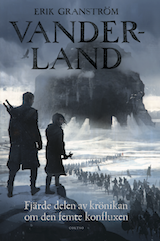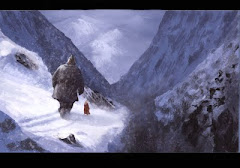
There has been a discussion on Discord recently about the pros and cons of the Unreliable Narrator style of the Forbidden Lands Roleplaying Game (RPG). Being one of the lead writers of the game and of its concepts, I thought I'd give my personal view and explain where it comes from. Now, I'm not that familiar with most RPGs, so I assume there are unreliable narrators in other games as well, but if so, my inspiration might come from elsewhere, and the setup might differ. I wouldn't know.
According to Wikipedia, an Unreliable Narrator is a narrator whose credibility is compromised. This can be due to a number of reasons: bragging, lying, filling in the gaps, misunderstanding, hallucinating etc. Unreliable narrators are not uncommon in first person renderings nor in movies, where at best the unreliability results in a twist – called Peripeteia by Aristotle.
In computer games, simplistic twists are common, often meaning that the good guys that you worked for actually turn out to be bad and vice versa. In an RPG however, the narrator traditionally is reliable: The Game Master (GM) reads how the world really works in the rule books and sets the game up accordingly. There is an actual, objective answer to most questions, for instance whether gods exists, how beings came into existance and how magic actually works. The players, on the other hand, often get fed lies and incomplete speculations, the decoding of which make up a big part of the game.
Not so in Forbidden Lands. In the basic Game Masters Guide, the GM may indeed read the elaborate history of the land, get descriptions on the kins (aka ”races”, which is a term I avoid out of various reasons) and their origins, read about gods etc. Pretty soon, however, the GM gets the impression the none of this seems to be entirely true. Do the gods actually exist? Is the presented history merely human-centric and politically biased – one narrative out of many possible ones? Did the dwarves actually build the planet? did the six primordial elves actually organize life? Were orchs made as a slave kin? Were humans led across the ocean by a raven god? Etc. The GM can't be sure.
I'm not aiming for ”gotchas” with this insecurity – setting up false pretenses and dropping red herrings to fool everybody. Nor do I seek to raise elaborate illusions that suddenly vanish into thin air.
My aim is instead to present facts, legends and observations about the forbidden lands that the viewer may percieve as patterns – different and ever changing patterns depending on changing perpective and new information coming up. Some of this stuff I won't even know about, since it is created in your individual game, but I'm confident that you'll make sense of it, since humans basically are pattern-oriented beings. Ideally, earlier observations may be fitted into the amended narrative, but in a new way, rather than turning out to be plain false, which of course also will happen as players know from the game's legends.
What I don't do in the Forbidden Lands RPG is present a ready-made pattern – ”the truth” about he world that many ask me about. Instead, I basically describe the forbidden lands in line with how I perceive our own world. Things happen around us all the time, and we try to make sense of it, fitting new information into contexts we already believe, arriving at the currently most useful and probable patterns, amending them as we go. This is also how research works.
I'm not saying I'm an adherent to alternate or totally made up facts like some current politicians and dictators. Things are and things happen. People say, see, think and do things that can't be denied, also in a game world. It's when we interpret, descibe and put these things into narratives and patterns that it gets weird. I do not believe that there even IS an objective way to decribe something at all. As soon as something is put into words, we have done assumptions concerning what and how something is to be told and in the process inevitably have discarded innumberable alternate ways to say it. This doesn't mean that anything goes, or that all descriptons are equally true – just like in research, different narratives fit more or less well with actual observations and also may serve different purposes.
The approach might be called postmodern, and was for instance used by writer Umberto Eco in ”Foucault's Pendulum” and ”The Name of the Rose”, where the protagonist, the detective monk William of Baskerville, strings together facts to a pattern that makes sense but turns out to be wrong.
So why don't I give the truth concerning The Forbidden Lands? Well, I personally think it gets more interesting and flexible and opens for more vividness and depth with some uncertainty. You may also see the unreliability as a challenge to myself as creator and to you as GM's and players, challenges delivered with love and confidence in your ability. Some may like it – some don't, but then there are other games.
The picture shows baron Münchhausen putting together his horse that was acidentally severed in two.
Artist: Gustave Doré













